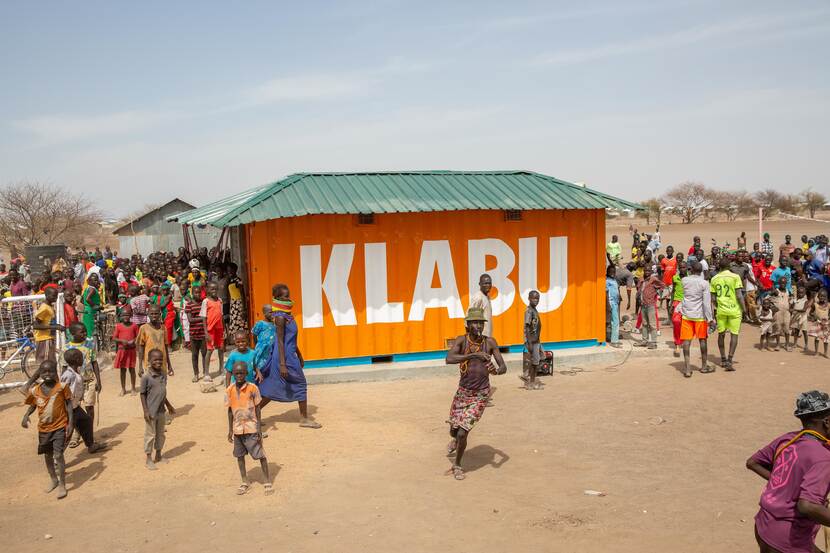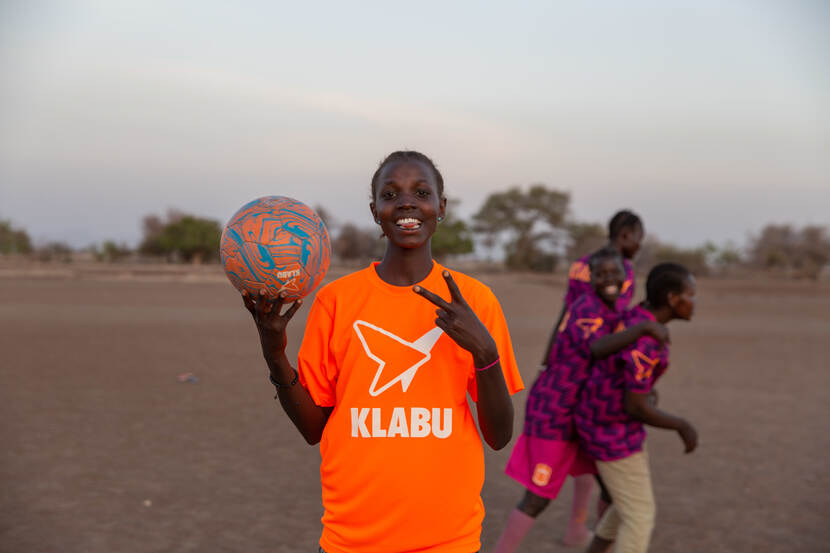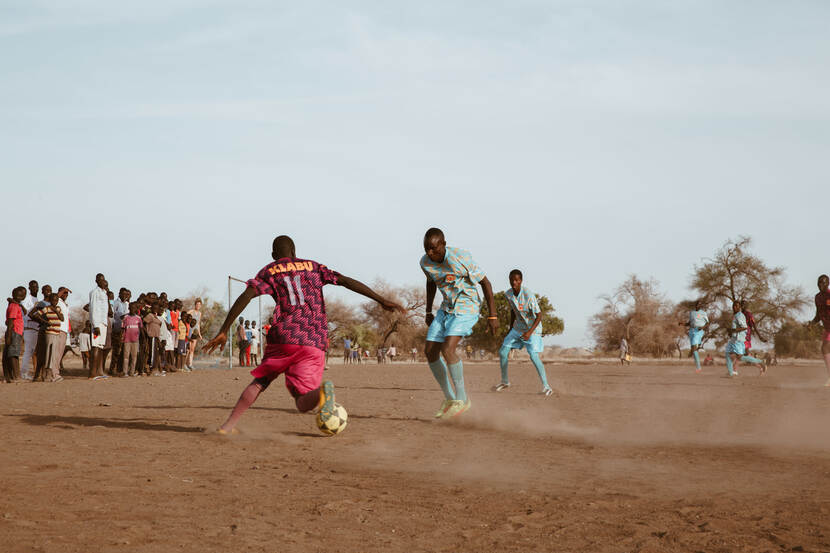Amsterdam-based KLABU brings sport to refugee camps
Jan van Hövell is using his Amsterdam-based humanitarian athletic brand KLABU to set up sports clubs in refugee camps. Klabu is the Swahili word for ‘club’, and the individual clubs are run by the local community. The first project has already been launched, in Kenya. In collaboration with the football club Paris Saint-Germain, KLABU is now working on setting up a sports club in Bangladesh. The aim is to get 500,000 refugees around the world into playing games and sports. ‘There are people with a physical disability who like to come by to play chess or just talk with someone. That’s not always so simple in these camps.’

The idea for the initiative arose when Jan was working for the UNHCR as a trainee at the Buduburam refugee camp in Ghana. ‘During my time there I saw how many young people there were in the camp and how few opportunities. At the same time there was a lot of talent and potential.’
KLABU is about laying the groundwork needed for sports. According to Jan there are many organisations that run programmes. He calls this ‘the software’. But what is often lacking is ‘the hardware’, i.e. the necessary equipment, such as footballs, shoes and athletic attire with long sleeves for Muslim girls. KLABU was able to devise a solution for this: a sport ‘library’ run by the local community.
A clubhouse is then built around the library with its own name and identity, where people can gather. The heart of the centre is the sports library, but people can also come by to use electricity or Wi-Fi, to watch sporting events on TV and, more recently, to listen to music and dance.
The decision of which sports to offer depends on local popularity. ‘We adapt our programme to demand on the ground,’ Jan explains. In Kenya, for example, girls were interested in doing yoga. At the camp there is now someone from Uganda who teaches yoga classes. ‘We don’t want to tie ourselves to a particular sport. Instead, we look at what people need and see where we can make a difference.’

Inclusivity
The people living in these camps are often from a great many nationalities. As Jan notes, they would not necessarily choose to share a living space, but with the help of sports, they can get to know one another and make friends. There is huge demand for activities that can help camp residents take their mind off their day-to-day reality, but there are not a lot of options. ‘You live there in a kind of no-man’s land, where you’re forbidden from working. In those circumstances it’s all too easy to get mixed up in the wrong kind of things, especially if you’re young. Sport can help break this cycle of negativity,’ he goes on to say. ‘There was a boy who told me: when I do sports, I feel tired afterwards – but in a good way – and I don’t think as much about all the difficult things in life.’
The clubs that KLABU is building are about more than just sports. They are also a rare bright spot in a refugee camp that brings people together. ‘There are people with a physical disability who like to come by to play chess or just talk with someone. And apart from sport KLABU brings a lot of joy to the community. That’s not the easiest thing in a refugee camp where most initiatives are solely concerned with keeping people’s basic needs met.’
In Kenya the majority of the population is under 18. The refugee camp discussed above is home to nearly 40,000 people. You see children everywhere you look. KLABU is focused mainly on children and young adults, both male and female, up to the age of 25. As Jan points out, it can be a challenge in some countries to get girls to participate. ‘This is why we try to get a good sense of what people want and how we can respond to that.’
Local cooperation
The first project was launched in Kalobeyei, in northern Kenya, near the border with Uganda and South Sudan. In collaboration with the football club Paris Saint-Germain, UNHCR and the Bangladeshi NGO Friendship, KLABU is now turning its attention to Cox’s Bazar in Bangladesh, the site of the world’s largest refugee camp. In addition, KLABU is now setting up a project with the Dutch NGO Movement on the Ground in Lesbos, Greece. The aim is to establish another 30 clubhouses around the world over the next 10 years, first in refugee camps and then anywhere that sport can contribute to a better future, such as slums. KLABU has also set up a sport programme for refugees and undocumented migrants in the Netherlands.
With KLABU, Jan seeks to do – and buy – as much as possible locally. The organisation also receives a lot of donations from sponsors. ‘We work closely with the UN and UNHCR. They open the doors of the refugee camps to us. What makes what we do special is that we work directly with the refugees in the camp. They are also in charge of running the club. It’s their KLABU.’
KLABU provides financial support, but it also help the club’s users create their own business model. In this way they can become independent over the long term, run their community and generate their own income. ‘That’s what makes this initiative so special: they do it themselves. And we help.’

Business model
Jan soon realised that as a foundation he would be dependent on donations. In order to become more independent he needed to generate income of his own. His solution was to design athletic clothing that, first and foremost, would make a difference in the refugee camps, but which could then be sold to the rest of the world. ‘We are a foundation that carries out projects in the camps, but we also run a social enterprise that manufactures athletic wear. Fifty per cent of the profits go to the foundation, and the other fifty per cent is invested in the development of the business in order to broaden our impact.’
In this way KLABU can become entirely independent from donations over the long term. Sponsors and donors are currently still essential, such as the football club Paris Saint-Germain and other supporters, such as the Dutch non-profit Wilde Ganzen, the Rabo Foundation and the DOEN Foundation. The proceeds from the sale of this clothing helps keep the clubs afloat. ‘This is what our brand is based on: by buying our products, you give refugees a chance to take part in sport at our clubs.’